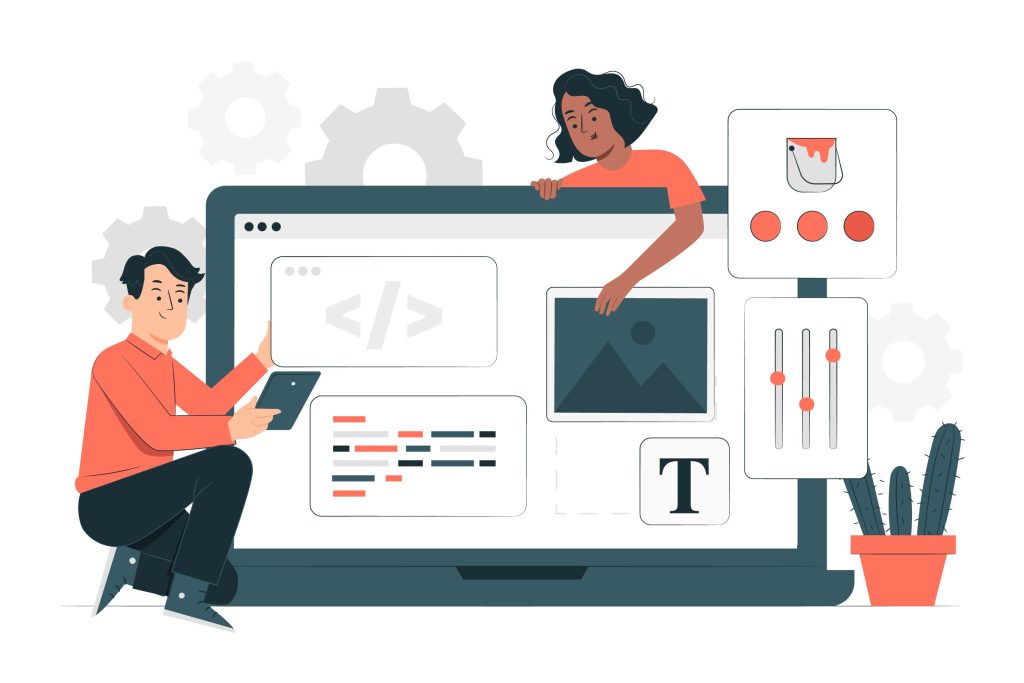In today’s digital world, having an effective online presence is essential for the success of any business. Web development plays a crucial role in this, allowing companies to create functional, attractive, and optimized websites to attract and retain customers. In this article, we’ll explore what web development is, its main components, and how it can benefit your business.
What is Web Development?
Web development refers to the process of creating and maintaining websites. It involves various aspects, including design, programming, content management, and search engine optimization (SEO). The goal is to create an effective and enjoyable user experience that meets visitors’ needs and supports business objectives.
Components of Web Development
1. Front-End Development: This part involves everything the user sees and interacts with on the website. It uses technologies like HTML, CSS, and JavaScript to create layouts, styles, and interactive functionalities.
2. Back-End Development: Refers to what happens behind the scenes on the website. It includes managing databases, servers, and application logic. Common technologies include PHP, Python, Ruby, and SQL.
3. Responsive Design: Ensures that the website works well on all devices, including computers, tablets, and smartphones. It uses flexible design practices to adapt the layout to the screen size.
4. SEO (Search Engine Optimization): Involves techniques to improve the website’s visibility on search engines like Google. It includes content optimization, appropriate use of keywords, and improving site loading speed.
5. Content Management: Using content management systems (CMS), such as WordPress, Joomla, or Drupal, to facilitate the creation and updating of content on the website.
Benefits of Web Development for Your Business
1. Enhanced Online Presence
A well-developed website provides a strong and professional online presence. It’s the first impression many potential customers will have of your business, and an attractive, functional design can help capture the attention and trust of visitors.
2. Increased Visibility
With proper SEO techniques, your website can achieve better rankings in search engine results, increasing visibility and attracting more organic traffic. This means more potential customers discovering your products or services.
3. Improved User Experience
Good web development focuses on creating an intuitive and enjoyable user experience. This includes fast loading times, easy navigation, attractive design, and relevant content. A better user experience can lead to higher visitor retention and conversions.
4. Accessibility and Compliance
A well-developed website ensures accessibility for all users, including those with disabilities. Following web accessibility standards (WCAG) not only broadens your site’s reach but also helps protect your business from potential legal issues.
5. Flexibility and Scalability
Web development allows you to create customized solutions that meet the specific needs of your business. Additionally, a well-planned website is scalable, able to grow and adapt as your business evolves.
6. Competitiveness
In today’s market, a professional and functional website can differentiate your business from the competition. Offering a robust, user-friendly online platform can be a deciding factor for customers.
How to Implement a Web Development Project
1. Planning and Research
Before starting development, it’s crucial to define your website’s goals, target audience, and required functionalities. Research competitors’ websites to understand what works well in your industry.
2. Choosing a Platform or Development Partner
Decide if you’ll use a CMS platform or develop a custom website from scratch. If you opt for a development partner, choose a company with a strong portfolio and good references.
3. Design and Prototyping
Create wireframes and prototypes to plan the structure and design of your website. Involve stakeholders in the process to ensure the final design meets business needs and expectations.
4. Development
During this phase, developers will turn the design into a functional website. Ensure that development includes good SEO practices, responsive design, and necessary functionalities.
5. Testing
Conduct thorough testing to ensure the website functions correctly on different devices and browsers. Test all features, links, and forms to identify and fix any issues.
6. Launch and Monitoring
After testing, launch your website and start monitoring its performance. Use web analytics tools to track traffic, user behavior, and conversions. Make adjustments as needed to continuously improve the site’s performance.
Conclusion
Web development is an essential component for any business looking to succeed in the digital world. A well-developed website not only enhances your company’s online presence but also increases visibility, improves user experience, and provides a competitive advantage. By following the steps mentioned and investing in quality web development, your business can attract more customers, increase sales, and grow sustainably.
FAQ
How long does it take to develop a website? Development time varies depending on the project’s complexity. Simple websites can be developed in a few weeks, while more complex projects may take several months.
What is SEO and why is it important for my website? SEO (Search Engine Optimization) is the process of optimizing your website to improve its visibility on search engines. Good SEO increases organic traffic and attracts more potential customers.
Can I update my website after launch? Yes, with a CMS platform or a well-developed website, you can easily update content, add new features, and make continuous improvements.
What is the difference between front-end and back-end development? Front-end development involves everything the user sees and interacts with on the website, such as layout and design. Back-end development refers to what happens behind the scenes, like database management and application logic.



